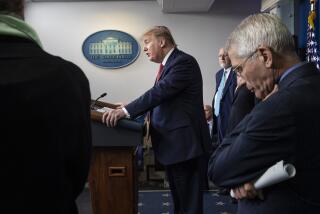Ethics trials highlight racial tensions in Congress
- Share via
Reporting from Washington — The prospect of two long-serving African American lawmakers in the House enduring unprecedented public ethics trials seems likely to add to the growing tension between black members of Congress and Democratic leaders on Capitol Hill and in the Obama administration.
FOR THE RECORD:
Ethics trials: An article in Sunday’s Section A about race and ethics allegations against Reps. Maxine Waters (D-Los Angeles) and Charles B. Rangel (D-N.Y.) misspelled the last name of Michael Steel, spokesman for Rep. John A. Boehner (R-Ohio), as Steele. —
Congressional sources confirmed late Friday that later this year Rep. Maxine Waters (D- Los Angeles) will face an ethics proceeding likely related to allegations that she sought to help a bank with ties to her husband receive federal bailout funds.
The House trial could come on the heels of the high-profile trial of Rep. Charles B. Rangel, the venerable Democrat from New York who is accused of 13 violations of House ethics rules. Like Rangel, Waters chose not to seek a settlement with House ethics investigators that would have involved some admission of wrongdoing.
Between them, Rangel, 80, and Waters, 71, have served in the House for six decades and are leading members of the Congressional Black Caucus. The caucus has long complained that the House ethics process disproportionally targets African Americans in the chamber.
Since its 2009 inception, the Office of Congressional Ethics — an independent watchdog set up at the behest of House Speaker Nancy Pelosi (D-Calif.) — has investigated at least eight members of the black caucus.
Earlier this summer, Rep. Marcia L. Fudge (D- Ohio), a member of the caucus, introduced a resolution that would strip the ethics panel of some of its power and allow House members to keep unflattering reports from public view. The caucus has stood behind Rangel even as other House members have called for his resignation.
Kenneth Gross, an ethics lawyer in Washington, said the push against Rangel and Waters “fuels the racial dimension.”
“It’s going to be so highly charged considering who the players are,” he added.
Waters came under scrutiny last year after Massachusetts-based OneUnited Bank, one of the nation’s largest minority-owned institutions, received $12 million in bailout funds.
The funding came three months after Waters, a senior member of the House committee that oversees banking, helped arrange a meeting between officials of the bank, other minority-owned financial institutions and Treasury Department representatives. Waters’ husband, Sidney Williams, had owned stock in the bank and served on its board.
Waters has previously said that she fully disclosed her husband’s ties to the bank.
Los Angeles Urban Policy Roundtable President Earl Ofari Hutchinson and other civil rights leaders in L.A. issued a statement Saturday supporting Waters, who represents parts of South Los Angeles.
“The ethics charges taint Waters’ record and work. They come at a time when Democrats are fighting to hold their majority in Congress,” Hutchinson said. “The political implications of the charges and the timing of them against her are clear. Sadly, the ultimate loser is her constituents.”
The probes have handed prime election-year fodder to Republicans. “Like Chairman Rangel, this is another example of Speaker Pelosi’s most glaring broken promise: to ‘drain the swamp’ in Washington,” said Michael Steele, a spokesman for Rep. John A. Boehner of Ohio, the House’s Republican leader.
Ethics advocates maintain that lax enforcement of House ethics rules encouraged Rangel and Waters to take defiant stands. Rep. Gene Green (D- Texas) may have furthered that perception late last week when he said panel members who investigated Rangel advised that he be given a simple reprimand, rather than a censure or expulsion from the House.
Neither Rangel nor Waters are ultimately expected to be forced to resign even if they are found guilty of breaking ethics rules.
Meredith McGehee of the Campaign Legal Center, a Washington ethics advocacy group, disputed the caucus’ contention that the House ethics process is racially biased. Instead, she said, veteran lawmakers who have little to fear from their constituents are more likely to run afoul of ethical standards.
“I understand their concerns,” McGehee said, “but it’s what happens when you are in a safe district. You don’t have a lot of competition.”
The ethics cases are the latest source of tension between the Congressional Black Caucus and Democratic leaders.
The caucus earlier this month was unhappy over the Obama administration’s treatment of black Agriculture Department official Shirley Sherrod, who was asked to resign after her remarks in a video clip were taken out of context. In addition, some members of the caucus believe Obama has done little to support the candidacy in Florida of Rep. Kendrick B. Meek, who is bidding to become the state’s first African American senator.
More to Read
Get the L.A. Times Politics newsletter
Deeply reported insights into legislation, politics and policy from Sacramento, Washington and beyond. In your inbox twice per week.
You may occasionally receive promotional content from the Los Angeles Times.











